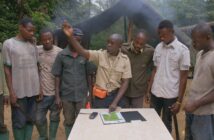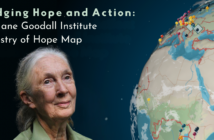Archbishop Tutu died aged 90 on 26th December. To my great regret I never got the chance to speak to him, though I closely followed his extraordinary career, and listened to his speeches and interviews when I could. He was appointed a priest in 1960 – the year that I first set foot in Capetown, South Africa. My excitement on finally arriving was tempered by the signs that I saw everywhere – translated from the Afrikaans “slegs blanke” they read “white people only.” I wasn’t brought up to judge people on the colour of there skin. From the very first, Desmond Tutu stood up against discrimination, resigning from his first job, teaching, because of the segregation of black children. It was then that he went into the church. But Tutu, despite being ordained in 1986 as Archbishop in Cape Town, thus becoming the head of the Anglican church in South Africa, never spoke out against other religions – because, he said, “God is not a Christian.”
In the 1970s, having been to university in the UK, he became deeply involved in the struggle against the apartheid system, speaking out against injustice and the abuse of human rights. As the regime became increasingly oppressive he compared it with Nazi Germany, and was never afraid to speak out against it, thus becoming the hero of the anti-apartheid movement. The regime finally came to an end during the Presidency of P.W. de Klerk and Tutu had been a major player in bringing this about. Subsequently the two of them were awarded the Nobel Peace prize. (de Klerk died just a couple of weeks before Archbishop Tutu).
Nelson Mandela was freed, by de Klerk, after 26 years in prison, and became the first Black president of South Africa. Archbishop Tutu criticised the ANC, the new government formed under Mandela, but the two agreed on the vision of a country in which people of all colours and persuasions would be treated as equals in ‘the Rainbow Nation’ – a term Tutu is credited with creating. Mandela appointed Tutu as chair of the Truth and Reconciliation Commission during which victims of apartheid spoke out about the terrible injustices they had endured. Desmond Tutu, a very deeply emotional person, was often seen on television weeping as he listened to some of the horrifying stories of abuse.
He was a man of great personal courage, conviction, and determination to fight injustice, not only in South Africa but around the world. And as far back as 2015 he used his popularity to gather over 333,000 signatures for a petition calling on the then U.S. President Barack Obama, former U.N. Secretary-General Ban Ki-moon and other leaders to set a target of 100% renewable energy by 2050. Subsequently he became the first chair of ‘The Elders” an international group of senior human rights activists and political leaders advocating for peace, and he used this platform to also push publicly for urgent measures to tackle climate change which he said was one of ‘the greatest moral challenges of our time’.
In spite of his constant fight against injustice, the very real pain and grief he felt for the suffering of others, joy and hope were two of the key elements of his life. He had a wonderful sense of humour and was known for his ready wit and outbursts of giggling laughter. He will be remembered for his indomitable spirit and his moral and spiritual leadership. My heartfelt sympathy for his family and close friends.
Desmond Tutu, you will surely be rewarded and praised in the world that lies waiting for the spirit of the deserving after leaving their earthly bodies. But don’t lose you sense of humour and impish chuckle.






